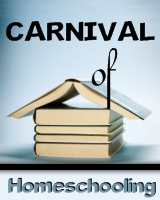 Sometimes I do doubt whether homeschooling is the way to go. I do. It's true. My wherewithal tends to head south as the doubtful comments, the probing questions, the discouragement mount from those who have never even given home schooling a try. And as fellow area homeschooling families with whom we began this journey give in to the pressure to conform and head either to public, private or any of a number of charter school options, their time is no longer theirs. We see them in fits and spurts between their classes or when obligations of the mainstream allow them a peek at freedom. We miss them.
Sometimes I do doubt whether homeschooling is the way to go. I do. It's true. My wherewithal tends to head south as the doubtful comments, the probing questions, the discouragement mount from those who have never even given home schooling a try. And as fellow area homeschooling families with whom we began this journey give in to the pressure to conform and head either to public, private or any of a number of charter school options, their time is no longer theirs. We see them in fits and spurts between their classes or when obligations of the mainstream allow them a peek at freedom. We miss them.I feel so fortunate, then, when I have an opportunity to discuss our process with an open-minded individual. Talking about what we're doing, why and even how inspires me. I see that we are doing amazing things and that staying true to this path is more important to abiding by the doubters.
Such an occasion arose this weekend. I had the day to myself Saturday to attend an all-day, fund-raising scrapbooking day. It's very seldom that I have an entire day to myself, and even LESS often that I work on the family scrapbooks. I woke early, packed the car and decided to further treat myself with a stop at a local bakery for breakfast. I read, enjoyed a breakfast bagel and coffee, tried not to eavesdrop on a group of men who had settled at a neighboring table to discuss their relationships and feelings. I should have known then that this would be no ordinary day.
As I packed in my dishes and headed for the door, I noticed a man reading a map on his laptop. I figured he was just passing through the area, perhaps looking for something I could help him find. It turns out Samuel, previously of Cameroon, lives in Santa Maria where he makes a living as an abstract artist. He also travels to Cameroon to teach children there about art and hopes someday to open a school there. We got to talking about the importance of art and art history itself, particularly African art history. The discussion was particularly interesting to me because this year I've opted to use art as the focus of our history studies. (It felt so much better than focusing on conquering and wars, which seems to be too much the focus of mainstream history studies.)
Talking to Samuel about what we're doing and discussing what he does with his students helped me understand more clearly just how significant my decision to use art as our focus may be. Together, we view works by great artists as we move chronologically forward in time. Then we read about events of the period, the countries and cultures of the artists, and while the girls try their hand at creating their own works in the selected artist's style, I read aloud to them. We may also play music of the era or from the artist's native land. Sometimes I read literature, other times it's further information about the period. Through art we are able to talk about historical events that may have helped shape the artists' lives, religion, science of the era, mathematics of art and, sure, conquest and warfare.
I don't really need studies to tell me that art is good for my child's development. Neither does Samuel. We see it our kids, those we teach, those we love. Our exploration of the arts gives us another avenue down which to explore, more paths of thought, windows into issues and events over which we may otherwise gloss or miss altogether. But it turns out there are plenty of people studying the effects of arts education on the brain. (And physical fitness, as well.) If you'd like to read more about those, here are some links:
Arts with the Brain in Mind (Harvard Review): "For Jensen, the arts 'are about life, growth, and expanding who we can become as human beings' (p. 110). Further, linking this chapter to the research studies that he cites earlier, Jensen claims that the arts defy conventional notions of assessment because what he considers to be the primary benefits of participating in artistic activities — the development of complex neurobiological systems — are difficult to measure and unfold over long periods of time."
Art and How it Benefits the Brain (Self-help Healing Arts Journal) "When individuals create art and reflect on it, the processes, increase self-awareness, initiate awareness of others and help people cope with stress, and traumatic experiences. Art enhances cognitive abilities and provides individuals with the ability to enjoy the life-affirming pleasures of making art."
Arts Appear To Play Role In Brain Development: Classes Can Change Brain And The Way People Think (Baltimore Sun)
The Effects of Art on the Brain of an Underprivileged Child (Bryn Mawr College) "Not only does art provide insight to external figures beyond their own bodies, but it can serve as a link for communication which is crucial in relating to society."
Photo courtesy Substance Abuse and Mental Health Service Administration under Creative Commons License.
Share this post with:





So many words swimming in my head! None of which seem to be able to form an intelligent sentence. So I summarize with "BRAVO!". And, keep up the good work!
ReplyDelete